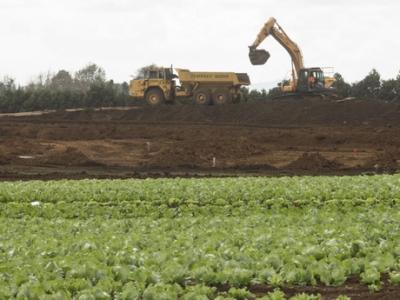Horticulture New Zealand (HortNZ) believes there is an opportunity for new economic investment projects such as a $1 billion per annum Regional Development (Provincial Growth) Fund, following the change in government.
Elections were held last month, with the National Party replaced by a coalition between Labour, NZ First and the Green party - to be led by Jacinda Ardern as Prime Minister. HortNZ Chief Executive, Mike Chapman admits while it is still early days and there is not a lot of detail around changes to policy and law yet, he says there are some opportunities surrounding regional development Matthew Russell writes in FreshPlaza.
"We have made it very clear that we want to work with the Government and be consulted as policy and law changes that affect horticulture growers are developed - and so far, there is every indication this will happen," Mr Chapman said. "A change in Government after nine years, and particularly the make-up of the new Government as an agreement between three separate and quite different parties led by the Labour Party, will undoubtedly have impacts on horticulture. We are aware that growers have concerns about some of the policies that the new Government has posed. It is our job to give voice to those concerns through the policy and law making processes as we represent growers in Wellington. We will continue to do this and have established some good connections with key Ministers."
One of the big changes to be announced so far by the new government is the scrapping of the Primary Industries portfolio, to be separated into Fisheries, Forestry and Agriculture. HortNZ says while exact details on how this will work are yet to emerge, the decision could have some positives and negatives.
"We welcome increased focus on the portfolios that cover horticulture, particularly biosecurity and food safety," Mr Chapman said. "We do have some concerns about some of the pan-industry funds continuing as the Primary Growth Partnership and Sustainable Farming Fund are vital to science and innovation being developed to keep New Zealand horticulture up with the rest of the world, and preferably ahead at the cutting edge. We would want to see some capacity in policy and law development to be inclusive of all the primary industries, which has been the advantage of the Ministry for Primary Industries."
He added he also has some concerns over Select Committee Inquiries (the coalition agreement has one into Biosecurity), as well as dismantling and rebuilding government departments has the potential to reduce productivity and slow down progress. One piece of legislation he does not want delayed is the Green Party's Consumers’ Right to Know (Country of Origin of Food) Bill 2016 which went through its first reading and was passed through to Select Committee prior to the election. The Select Committee is due to report back, which means it soon could be passed into law.
Another change Prime Minister Ardern made was to the Trade portfolio, which was expanded to include Export Growth, and HortNZ says retaining the current market access, while opening up new markets is critical to trade.
"We would want to see a continuation of free trade agreements, tariff reductions and the elimination of non-tariff barriers," Mr Chapman said. "Horticulture has a number of crops trying for access to the important Chinese market and we are certainly prepared to follow an “aspirational” path and work with the Government on export growth in our sector. (But) We have some concerns around restriction of foreign investment and the impact that might have on driving research and development and innovation."
Mr Chapman is pleased to see that the water tax appears to be off the table, but is mindful that improving fresh water quality is going to be a strong focus and it is likely that action in this area will begin within the first 100 days when there is impetus for the new Government to shape up on its election promises. While he says plans to increase the minimum wage over the next three years have all sorts of implications, including the consequence that all other wages will have to go up accordingly, creating a concern for small and medium sized businesses.
HortNZ has also been ramping up its ongoing calls for a national food security policy for the country, following mooted plans by Infrastructure New Zealand to grow a satellite city in Pukekohe housing 500,000 people. Mr Chapman last week took to several national television programmes, and other media platforms to advocate for the sector and wants the government to take action.
"We have indicated to the new (Agriculture) Minister Damien O’Connor that this is something we want to see progress under the new government," Mr Chapman said. "The basis of this policy is to ensure an ongoing supply of New Zealand grown fresh fruit and vegetables for New Zealanders to eat. With rapid urban development in many parts of New Zealand, we are concerned local interests will surpass the interests of a national food supply, with prime growing land being lost to housing and infrastructure. There needs to be a wider national interest view over the top of all the local government decision-making."

